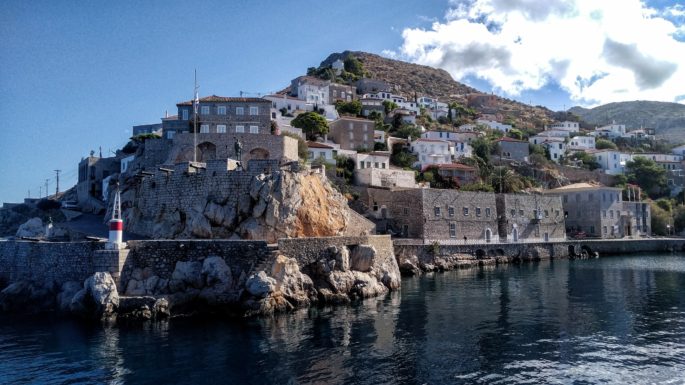With our Hydra Writing Retreat with Phil Cousineau on its way, it’s helpful that we take time to study writing’s impact on the writer as well as the reader. Writing is powerful. In ancient times, poetry shaped the ideologies of civilizations. For example, the poetry of Homer shaped the way the Mycenaens interacted with the divine. We’ll come to know how writing can help humanity as we look deeper into writing’s role in both past and contemporary contexts.
Writing: Divinity, Writer’s Block, and Doing “the Real Work”

Poets and novelists view writing as both arduous and rewarding. It’s a sacred act, one that brings us to our knees in the name of creation. But it can be difficult, long and difficult. Have you ever had ideas skipping through your head that suddenly ran away once sitting to write them? This kind of thing is the epitome of the writer’s life. Writers often talk about how they can only do their work when inspiration is imminent, when passion is pounding the veins and begging to get out onto a page.
Discouragement is a common symptom of the all-too-common writer’s block and of “life happening.” But as poet Gary Snyder recites, we must stick to “the real work.” The real work is the work we intuitively hold as the most important work of our lives. That’s where the writing retreat at Hydra comes in. The retreat is aimed at holding writers responsible for reestablishing their inner sense of genius.
Instead of spending our valuable writing retreat by critiquing each other’s work, during this writer’s retreat writers will be encouraged to spend their time developing their current manuscript or writing new material in a safe and invigorating atmosphere, and to take “the next step,” whatever that might be for them and their manuscript.
The Power of Myth and the Written Word

We believe the world needs to see your manuscripts and your words.
The written word is a powerful tool that has shaped and reshaped the world again and again throughout history. The earliest record of writing appeared in Mesopotamia around 3200 BC. This is modern-day Iraq. Writing was originally invented as a means of counting, recording, and keeping track of quantities and data, but eventually transformed into a tool for divinity and spirituality, myth and storytelling.
When many people hear “myth” or “mythical,” they automatically think “fake.” But the seasoned reader understands myth as holding many truths. As Joseph Campbell famously wrote: “Mythology is not a lie, mythology is poetry, it is metaphorical. It has been well said that mythology is the penultimate truth—penultimate because the ultimate cannot be put into words. It is beyond words. Beyond images, beyond that bounding rim of the Buddhist Wheel of Becoming. Mythology pitches the mind beyond that rim, to what can be known but not told.”`
Next, people might name good, meaningful mythology a thing of the past, yet the enormous body of modern literature and poetry make up our contemporary mythology, full of figures, stories, hidden meaning, worlds, magic, breathtake, and epiphany.
And what better place for myth to bring us literary pilgrims than Greece, renowned for its ancient body of literature? Often when scholars cultivate the idea that each civilization or empire has its great poet, they begin with Ancient Greece and Homer. Homer is the poetic genius behind, most notably, The Odyssey and The Iliad. Both epics are about gods, goddesses, heroes, divine intervention, and the ways of women and men. Artists have been invoking Homer’s work for millennia to add reputability to their own. In this sense, Homer has reached through the ages to inspire readers in his own work and the work of others. That’s the power of mythology.
Writing Retreat: a Catalyst for Creativity

Hydra, where we’ll be spending our days hacking away at our manuscripts, is an island of ample Greek culture and inspiration. Beyond the classes and tutorials that will be held, there will be plenty of time to experience the breathtaking island. This will enrich the stay and provide further inspiration for writing. Writing requires inspiration simply because writing is a powerful act. It is by no accident that the word “spell” is in the word “spelling.” Just as a magus might spend time weaving spells and spending his energy at the task, we writers weave transformative verse and tales which, yes, take energy.
Retreating is a good way to build inspiration. By pilgrimaging away from home, we leave day-to-day distractions and enter new worlds supportive of creative expansion. Travel settles the nerves, providing space for creativity to enter us as we learn, make friends, and experience lasting memories.
Rumi said that “travel brings power and love back into your life.” If it’s the type of love and power that filled Rumi’s life, then inspiration for writing will undoubtedly strike. At this, we naturally return to the idea that writing as art is a force of power and love in the world. Even if the writing doesn’t deal directly with these forces, it still inspires the creativity, connectivity, and divine inspiration necessary for them.
Most people who read Rumi describe his work as life-changing and the embodiment of peace and power. Like the work of Rumi, the literature of the Greek poets changed the world. The Odyssey teaches us how to voyage through the recesses of the world and the psyche so might we reconnect with the heart. Greek tragedy teaches us that the world works through a balance of light and shadow, yin and yang, living blissfully and navigating through our dark night of the soul.
Greece is a place of literary transformation and contains a deep, written history that can surely expand into contemporary writers.

